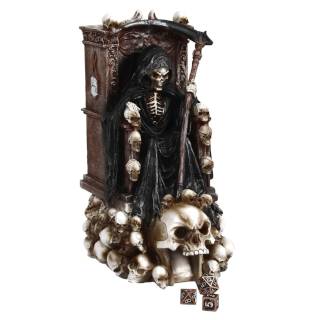Tip 1: Pick Your Stats Based on Party Role
The Cleric is often considered the most flexible of the core classes because there are several different ways to build a great Cleric.
For the most part, you’ll wantWisdomto be your highest Ability Score because it increases the DC of your spells and also increases your Spell Attack Modifier.
After Wisdom, it’s a bit more situational—your next highest Ability Score will depend on what role you intend to fill in the party.
Having a highStrength, for example, will help you deal more damage with melee attacks, ensuring that you can remain useful in fights even after you’ve run out of Spell Slots.
On the other hand, a highConstitutionwill ensure that you can survive and continue healing the rest of the party. If you’re the primary healer, you do no good if you end up being whomped early in a fight.
And if your party’s campaign expects to run into many characters of faith, you may have to be the face of the party—in which case a highCharismawill help you succeed with various social skill checks.
Related:Standard Array vs. Point Buy vs. Dice Rolls for Character Creation, Explained
Tip 2: Change Your Spells When Necessary
Unlike Wizards, Clerics don’t have to discover new spells by copying scrolls or spellbooks. Instead, Clerics automatically have full access to all the spells on the Cleric Spell List (referred to asKnown Spells).
After a Long Rest, Clerics can choose from their Known Spells and select which ones they want asPrepared Spells. In other words, Clerics can only cast Prepared Spells, but they can be switched out with every Long Rest.
While Sorcerers and Warlocks are locked into their spell choices, every day is a new day full of opportunities for Clerics.
Of course, you’re still limited as to which Known Spells you can select as Prepared Spells based on your character’s Level. But the day-to-day versatility is great, so make sure you take advantage of it.
After every Long Rest, anticipate what your party will be doing next, what kinds of people you might run into, what types of encounters await around the corner. Then, pick the best spells you can.
Guiding Boltis one of the best 1st Level spells in the game, as it not only inflicts a lot of damage but also grants Advantage to the next attack made against that target—even if you aren’t the one attacking.
But if you’re in a party with characters who makelotsof attacks every round, considerBlessinstead, which adds a D4 to their attacks.
Related:Useful D&D 5e Spells You Shouldn’t Overlook for Your Characters
Tip 3: Understand Channel Divinity
At 2nd Level, Clerics gain theChannel Divinityability, which allows them to manifest the full might of their deity into the material world.
Channel Divinity has many features depending on the character development choices you make, but all Clerics gain access to theTurn Undeadability through it.
Turn Undead forces all undead within 30 feet to make a Wisdom saving throw. Failure causes them to flee, which is great for clearing space on the battlefield and letting your party breathe in a fight.
Note:Turn Undead doesn’t cause damage. It merely causes them to run away in fear.
Prior to 6th Level, Clerics can only use Channel Divinity once and can only use it again after it recharges with a Short Rest or Long Rest.
The other Channel Divinity abilities you get will depend on your chosen Divine Domain. However, no choice of Divine Domain will increase the number of times you can use Channel Divinity per rest.
Related:Which D&D Class Should You Play?
Tip 4: Pick Your Divine Domain Wisely
While other classes inD&D 5edon’t choose their defining features until 3rd Level, Clerics choose their Divine Domain at 1st Level.
Divine Domainrepresents the influence of the Cleric’s deity over the mortal world and, as such, has a big impact on how the Cleric interacts with other agents that share the same faith.
Each Divine Domain has unique features that make them suitable for different roles in a party. For example, Divine Domains have specificDomain Spellsthat aren’t available on the normal Cleric Spell List.
TheD&D 5e Player’s Handbookhas a decent number of core Divine Domains, and subsequent releases have expanded with more.
If you want to fill the role of healer in your party, theLife Domainis your best bet. Not only does it empower all of your healing spells, but you also gain access toChannel Divinity: Preserve Life, which can revive fallen comrades without needing to be in touch range.
TheKnowledge Domainis great if you want to support your party as an arcane caster, complete with divination-centric Domain Spells, plusChannel Divinity: Read Thoughtsthat lets you read a creature’s mindandcast Suggestion on it without expending a Spell Slot.
And for melee-focused Clerics, theWar Domaingives you access to heavy armor and martial weapons along with an extra attack per round.
Combine that withChannel Divinity: Guided Strikefor +10 on Attack rolls andChannel Divinity: War God’s Blessingto grant +10 to Attack rolls for another creature within 30 feet of you? War Clerics are formidable entities that are tough to beat on the battlefield.
Read next:The Best YouTube Channels for Learning Dungeons & Dragons



![]()





























